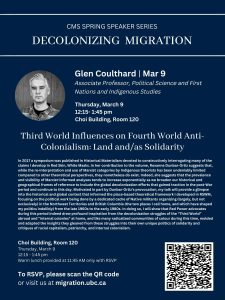Please RSVP below for event, or event+lunch.


Speaker bio
Glen Coulthard is an Associate Professor in First Nations and Indigenous Studies and in the Department of Political Science. Glen has written and published numerous articles and chapters in the areas of contemporary political theory, Indigenous thought and politics, and radical social and political thought (marxism, anarchism, post-colonialism). His work on Frantz Fanon and the politics of recognition won Contemporary Political Theory’s Annual Award for Best Article of the Year in 2007. He is Yellowknives Dene.
Abstract
In 2017 a symposium was published in Historical Materialism devoted to constructively interrogating many of the claims I develop in Red Skin, White Masks. In her contribution to the volume, Roxanne Dunbar-Ortiz suggests that, while the re-interpretation and use of Marxist categories by Indigenous theorists has been undeniably limited compared to other theoretical perspectives, they nonetheless do exist. Indeed, she suggests that the prevalence and visibility of Marxist-informed analyses tends to increase exponentially as we broaden our historical and geographical frames of reference to include the global decolonization efforts that gained traction in the post-War period and continue to this day. Motivated in part by Dunbar-Ortiz’s provocation, my talk will provide a glimpse into the historical and global context that informed the place-based theoretical framework I developed in RSWM, focusing on the political work being done by a dedicated cadre of Native militants organizing (largely, but not exclusively) in the Northwest Territories and British Columbia (the two places I call home, and which have shaped my politics indelibly) from the late 1960s to the early 1980s. In doing so, I will show that Red Power advocates during this period indeed drew profound inspiration from the decolonization struggles of the “Third World” abroad and “internal colonies” at home, and like many radicalized communities of colour during this time, molded and adapted the insights they gleaned from these struggles into their own unique politics of solidarity and critiques of racial capitalism, patriarchy, and internal colonialism.
The registration for this event is now closed.
